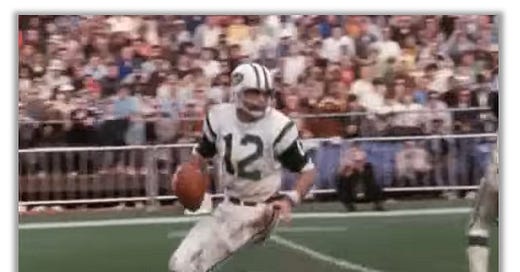On this day in 1968, the infamous “Heidi Game” is played. The fierce contest between the New York Jets and the Oakland Raiders led to unexpected controversy, forever changing the way that football is broadcast into American homes.
Younger generations of Americans do not remember how television used to work. There was no live-streaming. There were no shows on demand. A handful of networks dominated the landscape, determining what Americans could and could not see. The only way to watch a show was to be in front of the TV at the right time.
But on November 17, 1968, football fans learned that being in front of the TV wasn’t enough, either. The events that followed have caused the Heidi Game to be called the “most memorable regular-season game in NFL history.”
The Jets were playing the Raiders in Oakland on that day, which left many Jets fans watching the game on NBC. “[T]here was much more at stake than a matchup between two of the old AFL’s best teams,” sportswriter Dom Cosentino explains, “who both carried identical 7-2 records into the game. There was genuine hate.”
Just one year earlier, the two teams had met in a brutal match.
“The 1967 game was one of the most vicious in Jet history,” Jets beat writer Paul Zimmerman remembered. “[Jets quarterback Joe] Namath was hit late, punched in the groin. They aimed for his knees, tried to step on his hands.”
Namath got hit so hard that his cheekbone broke.
Needless to say, the Jets arrived at the stadium in November 1968, determined to win—and their fans at home were determined to watch on TV! NBC had allocated three hours for the game, then it planned to begin the made-for-TV movie, Heidi, at 7:00 p.m. The movie had been hyped for weeks.
You know that a vicious contest between the Raiders and the Jets wasn’t going to end on time, right? Well, it didn’t. There were too many penalties in the heated contest.
The operations team at NBC found themselves in a bit of a quandary.
Timex was sponsoring Heidi, but NBC’s agreement with Timex included a guarantee that the movie would start on time. (Pun intended?!) On the other hand, the Jets-Raiders game was getting pretty intense, and it seemed like a mistake to interrupt the live game.
Phone lines were flooded with calls from anxious viewers.
“There were equal numbers of people calling in to find out if Heidi was going to be on time as there were football fans who wanted to know if we were going to see the end of the game,” NBC Broadcast Operations Supervisor Dick Cline later explained. “They collided on a switchboard that blew up.”
There were so many calls that 26 fuses on the switchboard blew! In the meantime, NBC executives had finally decided to let the live broadcast continue, despite the planned Heidi schedule, but the lines were so jammed that they couldn’t get through to their own employees.
“The Jets were winning, 32-29, with less than a minute to play when NBC cut away,” Cosentino describes. “They somehow wound up losing, 43-32, and the outrage from angry viewers that ensued changed the course of game broadcasts forever.”
While the opening strains of Heidi played for viewers in the Eastern and Central time zones, the Raiders scored a 43-yard touchdown, closely followed by a fumble recovery and another touchdown—all in the final minute of the game.
You can imagine the uproar when Jets fans figured out what had happened.
“Probably the most significant factor to come out of Heidi was, whatever you do, you better not leave an NFL football game,” NFL chief of broadcasting Val Pinchbeck laughed.
Either way, the Jets got the last laugh when they won Super Bowl III just two months later.
Sources can always be found on my website, here.





Very interesting! I never knew any of this stuff about those football games and the TV controversy. Thanks for posting this story, Tara.
I didn't see this live (I was 5 years old at the time) but my dad, a huge football fan, referenced the "Heidi Bowl" as he called it, often. "This is a good game, they better not make it the Heidi Bowl" he would say hoping they wouldn't preempt his game.